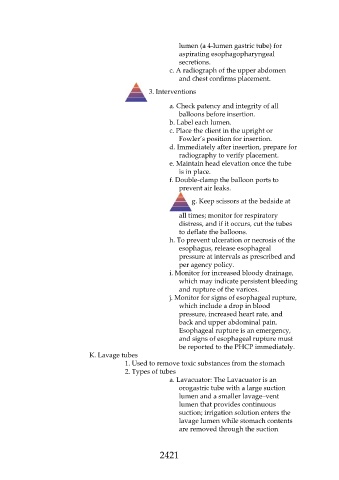Page 2421 - Saunders Comprehensive Review For NCLEX-RN
P. 2421
lumen (a 4-lumen gastric tube) for
aspirating esophagopharyngeal
secretions.
c. A radiograph of the upper abdomen
and chest confirms placement.
3. Interventions
a. Check patency and integrity of all
balloons before insertion.
b. Label each lumen.
c. Place the client in the upright or
Fowler’s position for insertion.
d. Immediately after insertion, prepare for
radiography to verify placement.
e. Maintain head elevation once the tube
is in place.
f. Double-clamp the balloon ports to
prevent air leaks.
g. Keep scissors at the bedside at
all times; monitor for respiratory
distress, and if it occurs, cut the tubes
to deflate the balloons.
h. To prevent ulceration or necrosis of the
esophagus, release esophageal
pressure at intervals as prescribed and
per agency policy.
i. Monitor for increased bloody drainage,
which may indicate persistent bleeding
and rupture of the varices.
j. Monitor for signs of esophageal rupture,
which include a drop in blood
pressure, increased heart rate, and
back and upper abdominal pain.
Esophageal rupture is an emergency,
and signs of esophageal rupture must
be reported to the PHCP immediately.
K. Lavage tubes
1. Used to remove toxic substances from the stomach
2. Types of tubes
a. Lavacuator: The Lavacuator is an
orogastric tube with a large suction
lumen and a smaller lavage–vent
lumen that provides continuous
suction; irrigation solution enters the
lavage lumen while stomach contents
are removed through the suction
2421

